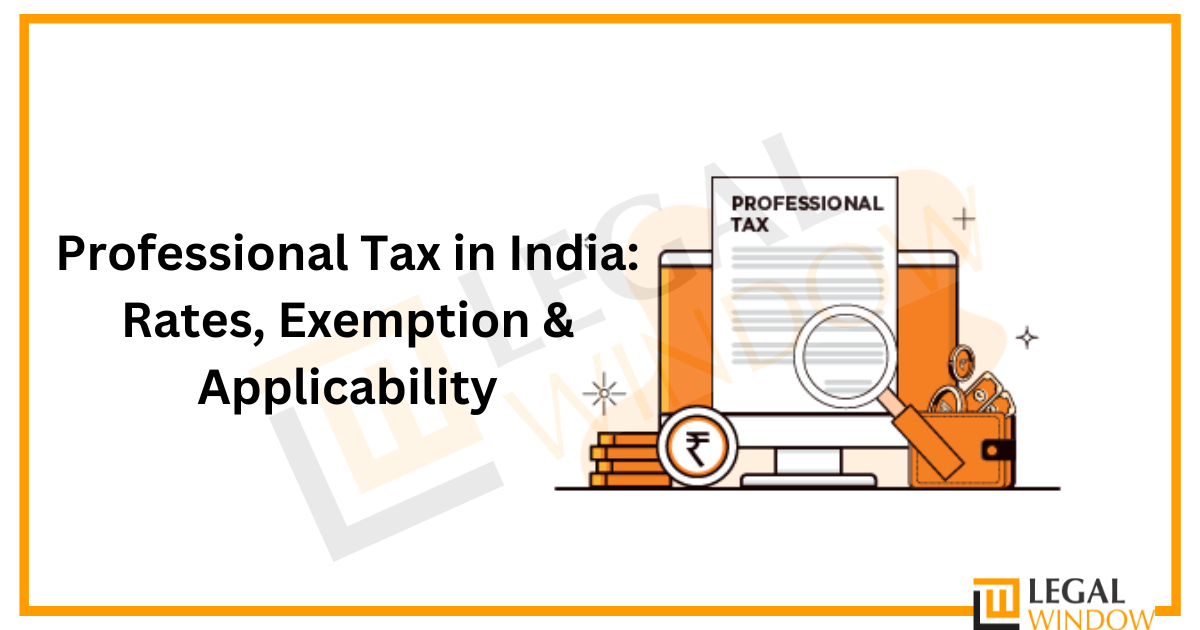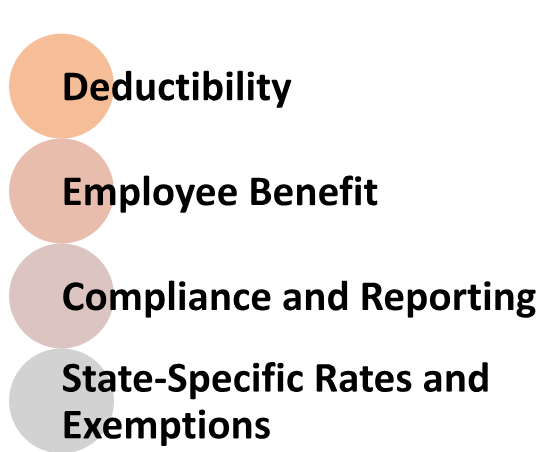Professional Tax in India: Rates, Exemption & Applicability
- September 29, 2023
- Income Tax

We have to meet with the area of professional tax in India. It is a mandatory contribution imposed by state governments on individuals earning an income through employment or self-employment. The article deals with the varied tax rates, exemption criteria, and applicability guidelines that navigate the professional tax landscape in India.
Table Of Contents
Professional Tax Rates
Professional tax rates vary by state in India. Individuals who receive a salary or income from any profession, trade, or employment are generally subject to professional tax. The rates are given by different state governments and those are divided on the basis of their income.
For instance, in Maharashtra, the professional tax slab rates range from Rs. 1750 to Rs. 2500 per annum, depending on the salary. So, what is professional tax in salary may vary in different states. But in the case of another, it may vary from Rs. 800 to Rs. 2500 per annum. The reason for varying amounts stands in the hands of a particular government.
It is essential to note that professional tax is deducted at the source by the employer and deposited with the state government. Different states may have different criteria for exemption or relaxation of professional tax for certain categories such as senior citizens, physically disabled individuals, etc.
The rates also differ based on the classification of professions. For example, government employees and certain exempted categories might be taxed at lower rates or completely exempted from professional tax. However, the maximum cap on professional tax, as set by the Indian Constitution, is INR 2,500 per annum.
Exemption from Professional Tax
Several individuals are either partially or completely exempted from paying professional tax. These professional tax exemptions are granted based on factors such as income, age, profession type, and government positions held. Common groups qualifying for exemptions include pensioners, senior citizens, blind individuals, physically challenged individuals, widows, journalists, and members of the defense forces.
Additionally, there are often thresholds beyond which professional tax is not applicable. For example, in some states, individuals earning below a specified threshold, usually INR 7,500 per month, are exempted from professional tax payments. Such exemptions aim to reduce the burden of tax on lower-income individuals and prevent undue hardship.
Also, read: How to apply for Professional Tax Registration in Rajasthan?
Applicability of Professional Tax:
The tax is generally collected by the employers on behalf of the state government and deducted from the salaries of employees before payment. Self-employed professionals are required to register themselves with the tax department and pay the tax based on their income and rates specified by the appropriate state government.
It is crucial to note that the applicability of professional tax can vary across states. For instance, Maharashtra imposes strict penalties, including fines and imprisonment, for non-compliance and delay in payment of professional tax. In contrast, some states have more lenient enforcement and collection processes.
Professional Tax in the aspect of the Income Tax Act:
Professional Tax is a state-level tax imposed on individuals and entities engaged in a profession, employment, or calling. It is governed by the respective State Government laws and regulations. Although Professional Tax is not directly connected to the Income Tax Act, 1961 there are certain aspects where it interacts with the income tax provisions. After all, the professional tax is not refundable. Once professional tax is deducted from an individual, it is not qualified for a refund.

- Deductibility
In certain scenarios, while calculating taxable income under the Income Tax Act the Professional Tax paid by a person can be claimed as a deduction. Section 16(i) of the Income Tax Act, 1961 expresses the allowance for the deduction of Professional Tax paid by salaried individuals from their income (salary). - Employee Benefit
Professional Tax is probably considered an employment-related tax, and as like, it becomes the employer’s responsibility to deduct professional tax from the employee’s salary and deposit it with the State Government. - Compliance and Reporting
Employers are required to deduct and deposit Professional Tax on behalf of their employees as per the respective State Government regulations. Non-compliance with these regulations may lead to penalties and legal consequences. Employers must also report the Professional Tax deducted and paid in the respective Form 24Q while filing their quarterly TDS returns under the Income Tax Act. - State-Specific Rates and Exemptions
The rates and exemptions for Professional Tax vary across different states in India. It is important for individuals and employers to be known of the specific rates applicable in their respective states and ensure compliance with the relevant provisions.
Impact on Professionals and the Economy
The imposition of professional tax in India has both positive and negative implications for professionals and the economy as a whole.
- Revenue Generation: Professional tax contributes significantly to the revenue of state governments, enabling them to undertake developmental initiatives and provide necessary infrastructure and public services. The tax revenue collected can be allocated to sectors such as healthcare, education, transportation, and sanitation, thereby fostering economic growth.
- State Disparities: Professional taxes impose an additional burden on professionals, particularly those with low financial resources. Paying professional tax, in addition to income tax, Goods and Services Tax (GST), and local taxes, can strain individuals’ financial capacity, particularly those in lower income levels.
- Compliance Efficiency: Professional taxation necessitates an efficient tax collection technique as well as adequate record-keeping. As a result, it encourages professionals to keep accurate financial records and follow tax requirements, thereby encouraging better financial management practices.
End Note
Professional tax in India serves as a means to generate revenue for state governments while simultaneously imposing a burden on professionals. The rates, applicability, and exemptions associated with professional tax vary across states, resulting in differences in the tax burden on professionals. While the tax contributes to development and public welfare initiatives, policy considerations should focus on maintaining a balance between revenue generation and minimizing the burden on professionals, especially those in lower income brackets. Improving the professional tax structure could help address these concerns, nurturing a more equitable and supportive environment for professionals in India.
In case of any query regarding Professional Tax in India: Rates, Exemption & Applicability, feel free to connect with our legal experts at Legal Window at 72407-51000.
CA Pulkit Goyal, is a fellow member of the Institute of Chartered Accountants of India (ICAI) having 10 years of experience in the profession of Chartered Accountancy and thorough understanding of the corporate as well as non-corporate entities taxation system. His core area of practice is foreign company taxation which has given him an edge in analytical thinking & executing assignments with a unique perspective. He has worked as a consultant with professionally managed corporates. He has experience of writing in different areas and keep at pace with the latest changes and analyze the different implications of various provisions of the act.
Categories
- Agreement Drafting (23)
- Annual Compliance (11)
- Change in Business (36)
- Company Law (148)
- Compliance (90)
- Digital Banking (3)
- Drug License (3)
- FEMA (17)
- Finance Company (42)
- Foreign Taxation (6)
- FSSAI License/Registration (14)
- GST (118)
- Hallmark Registration (1)
- Income Tax (200)
- Latest News (34)
- Miscellaneous (164)
- NBFC Registration (8)
- NGO (14)
- SEBI Registration (6)
- Section 8 Company (7)
- Start and manage a business (21)
- Startup/ Registration (128)
- Trademark Registration/IPR (40)
Recent Posts
- Post incorporation compliances for companies in India April 30, 2024
- Startup’s Guide to Employee Stock Ownership Plans April 29, 2024
- Master Secretarial Audit: A Complete Compliance Guide April 27, 2024
About us
LegalWindow.in is a professional technology driven platform of multidisciplined experts like CA/CS/Lawyers spanning with an aim to provide concrete solution to individuals, start-ups and other business organisation by maximising their growth at an affordable cost.









